How Camilla and Marc T-shirts can help ovarian cancer research fight
More research — and funding — is needed to create an early detection test for the most deadly cancer women face.
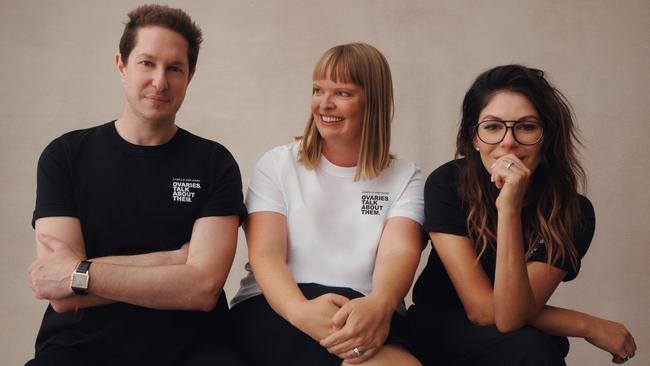
Fashion house Camilla and Marc isn’t just another label looking for a cause to latch on to – and its ovarian cancer fundraiser, now in its second year, isn’t a just a marketing exercise.
Nor are the powerful women rallying in support of the Ovaries: Let’s Talk About Them campaign the types who usually go looking for publicity.
The insidious disease, known as Australia’s most deadly cancer in women, robbed Camilla Freeman-Topper and her brother, Marc Freeman, of their mother when they were aged 11 and 13 respectively. Last year, when Freeman-Topper’s daughter was that age, the pair launched the charity, which has united prominent Australian women in grief, and a passionate commitment toward raising awareness and prevention.
Monica Saunders-Weinberg, one of Australia’s leading philanthropists, is one such supporter.
The low-key rich-lister, who has known the fashion pair since they were children growing up in Sydney’s eastern suburbs, tells The Australian: “We went to school together. Camilla is one of my best friends and Marc is a very close friend. I watched their pain losing their mother at a very young age.
“I don’t have a personal connection to ovarian cancer but I do have a personal connection to cancer. When I was 10 my mother was diagnosed with cancer and I watched her suffer and fight the disease that ultimately led to her death at age 55. I suffer watching people suffer and I am petrified of the ‘C’ word. I am diligent and religious about testing, as we all know that early detection can often be prevention.
“Camilla and Marc and I have shared, and we continue to share, in our story of grief. This campaign has given everyone an opportunity to target and stand up for an area that needs our determination, collective abilities and healing.”
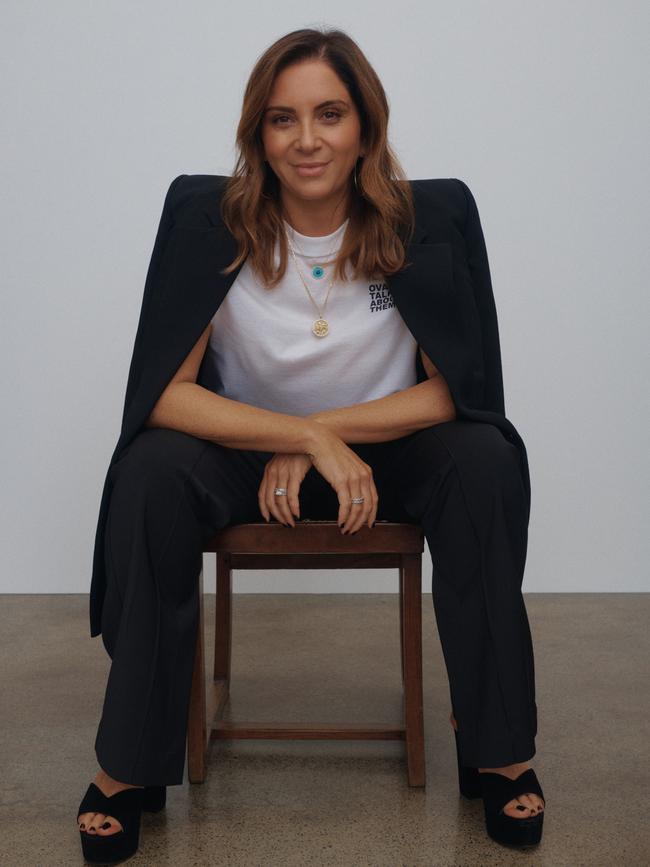
Saunders-Weinberg, whose late father, John Saunders, co founded the Westfield shopping group with Frank Lowy, gave financial support for the campaign last year but this year has also agreed to join 100 people around the world as part of a campaign to raise funds to find a test for the deadly cancer.
“It’s simple,” she says. “The deadliest disease that faces women is ovarian cancer. We can’t ignore it. There could be a deadly ticking bomb inside any of us and we have no way of knowing about it or testing for it. This scares me to my core. We need to do something about this urgently.”
Saunders-Weinberg had been staunchly publicity-averse before making steps toward a higher-profile role in 2019 when she took on the position as chair of the prestigious Gold Dinner committee, which raises money for Sydney children’s hospital.
She has said she had been inspired to continue the philanthropic tradition set by her father, who founded the Sydney Jewish Museum and helped other charities. “I hold that dear to me and that’s how I keep his legacy alive for me,” she says. “The world needs healing all the time and what better way but to give back.”
In its first year, the sale of Camilla and Marc T-shirts raised $225,000 but, say the pair, that was only the beginning.
This year, limited-edition unisex T-shirts and hoodies bearing the “Ovaries, Talk About Them” slogan are on sale. All proceeds raised go to Associate Professor Caroline Ford’s early detection test and her team at the Ovarian Cancer Research Group UNSW
Freeman-Topper says the campaign is structured around a five-year plan aimed at accelerating research to find an early detection test and begin clinical trials.
“The statistics for this disease have not changed in almost 30 years, yet it is the deadliest female cancer,” she says. “Part of the problem is that there is a stigma attached to women and men talking openly about ovaries so it lacks the funding that would save millions of lives.”
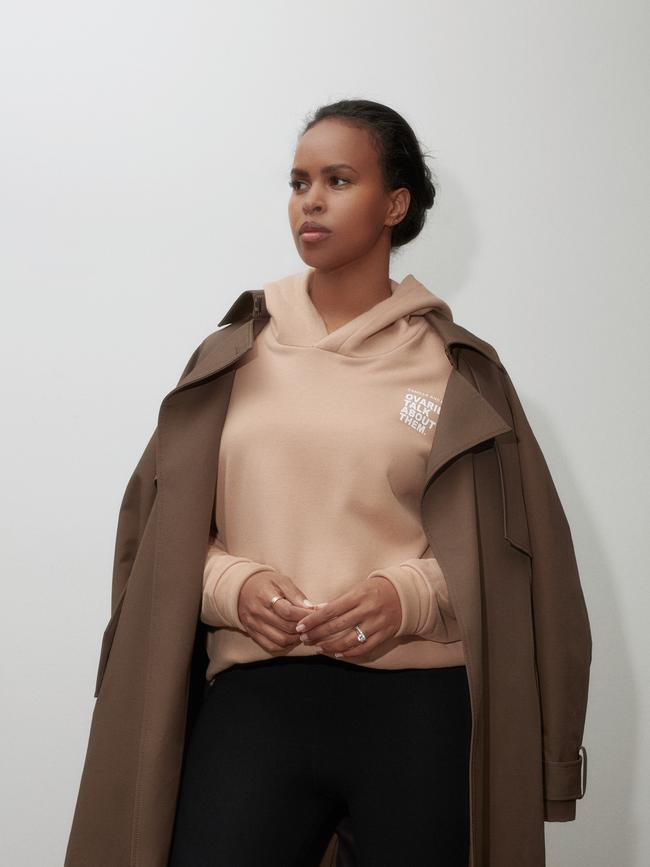
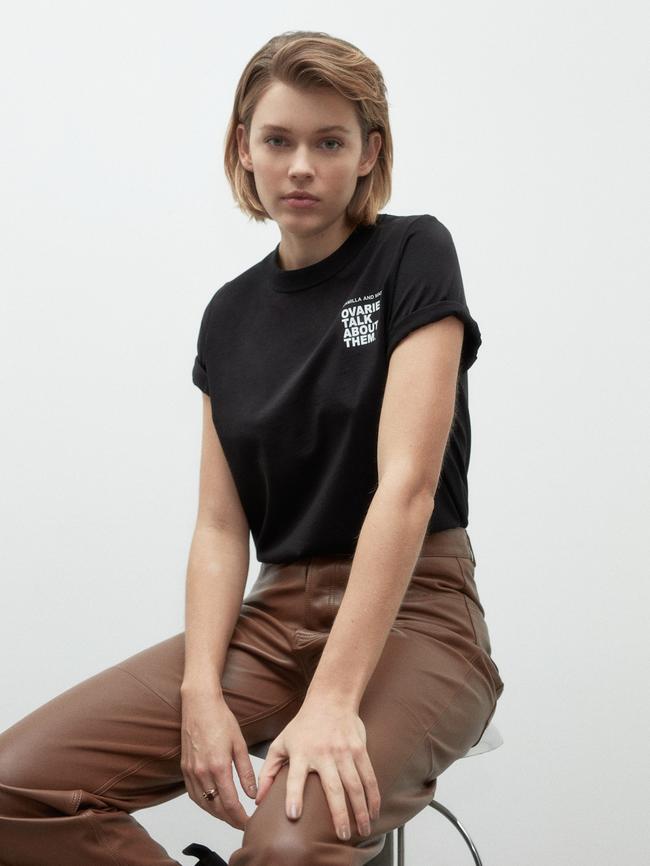
Her brother adds: “Mum was 42 when we lost her. She battled with ovarian cancer for a number of years, so she would have been my age when she was going through that battle.
“We had a son about a year and a half ago and it has made me think about her struggle from her perspective, how she would have felt about missing out on so much more of her life, about leaving two young kids and a husband behind.
“It is so important to donate money directly to the labs that are actually making the discoveries, otherwise the most important research just isn’t able to progress.”
The campaign launches on Monday with a video aimed at increasing awareness. More than 100 men and women have been photographed wearing T-shirts or have filmed messages of support.
Suzy Nicoletti, managing director of Twitter Australia, is participating.
“My mum passed away from ovarian cancer 12 years ago. She didn’t recognise the symptoms of ovarian cancer and her doctor misdiagnosed her twice,” she says.
“By the time she was properly diagnosed, the cancer had progressed to the advanced stage, which she battled for eight years through multiple surgeries and rounds of chemotherapy.
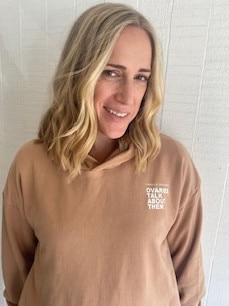
“What makes the ‘Ovaries, Talk About Them’ campaign so important in the fact that there is no early detection test today which would have helped women like my mum potentially catch this disease in an earlier and more treatable stage.
“Conversation is powerful. It helps us come together to unify our voices to create awareness and drive progress. When people speak out on a difficult issue, it often gives others courage to do the same. My hope for the ‘Ovaries, Talk About Them’ campaign is that it helps give confidence to men and women to speak out and come together, so that we can all work together to drive change for this disease.”
Every day, four Australian women are diagnosed with ovarian cancer and three women will die from the disease, says Associate Professor Ford. “Ovarian cancer is the deadliest cancer of women. Yet, we don’t hear about it. We do have a challenge with ovarian cancer in that it’s an internal organ and we don’t feel a lump like we do with breast cancer or see a skin change as we would in melanoma. So the symptoms of ovarian cancer, unfortunately, are very similar to symptoms that women may have during the normal course of a month or their menstrual cycle.
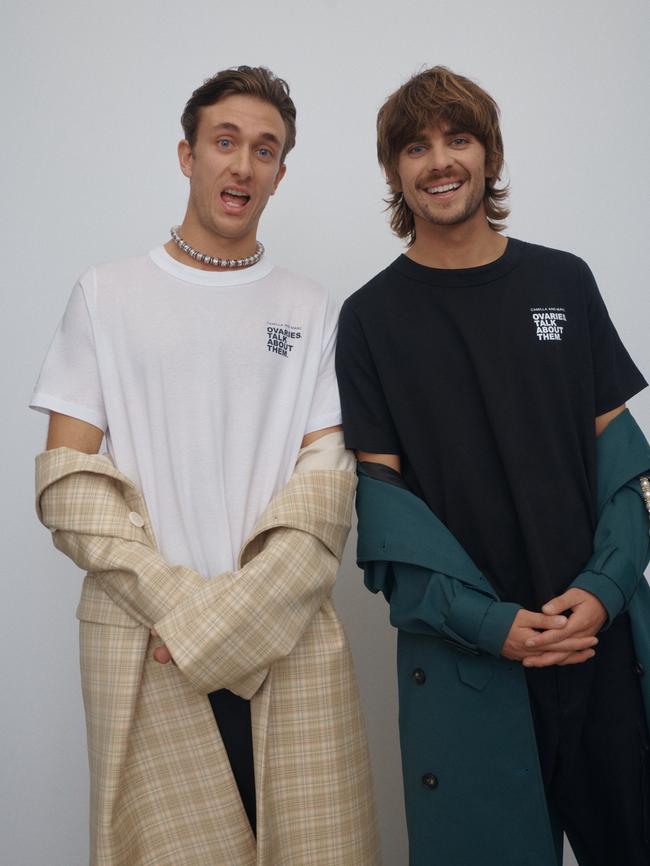
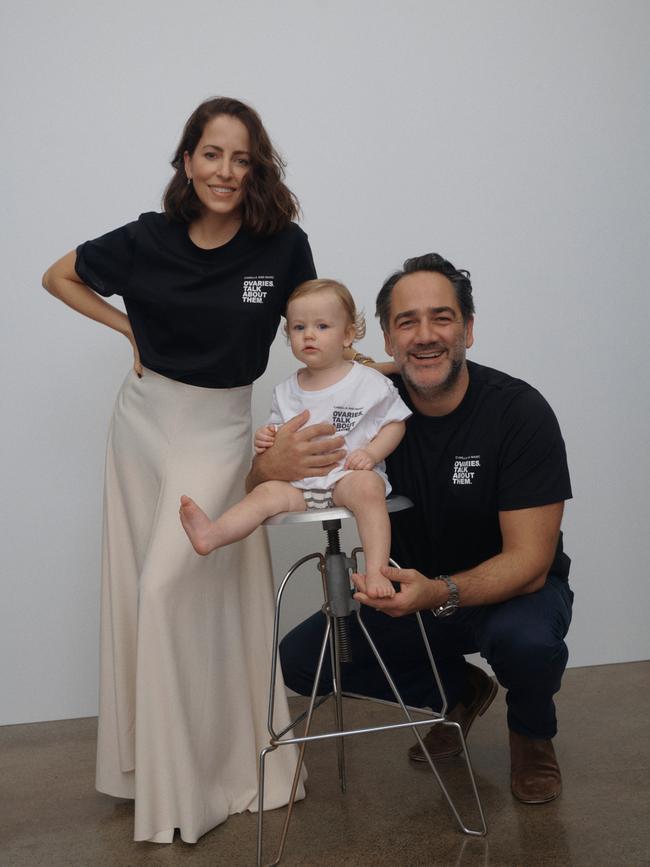
“We need to have an early detection test that can be as regular as a cervical screening test or a pap smear or a blood test, where women can regularly go and see their doctor or GP and be tested for it, throughout their life. We need to understand the science and the biology of ovarian cancer in order to develop an early detection test. Without funding, there’s no way we’re going to get there. But with funding, the more hours, the more scientists, the more committed researchers like those in my team, we will absolutely get there.”
Caitlin Delaney is a mother and IVF scientist with stage four ovarian cancer. Earlier this year, she told an Ovarian Cancer Australia breakfast at Parliament House in Canberra, attended by Scott Morrison, that she had been diagnosed four years ago, at age 39. “The power of human ingenuity has never been more in evidence,” she had said. “At this breakfast last year, imagine if I’d stood here and said: ‘Prime Minister, Health Minister, this year you will lead the world in withstanding a global pandemic for which a vaccine will be developed and distributed within a single human gestation period.
“The word ‘impossible’ has never meant less. In the last year, a scary, strange year, I saw our country come together to achieve impossible things, and it gave me that ever-elusive hope, because it told me that we can change the story. We can change the story of ovarian cancer.”
Speaking in support of the Ovaries: Let’s Talk About Them campaign, Delaney tells The Australian: “I feel like I got the ‘wrong cancer’.
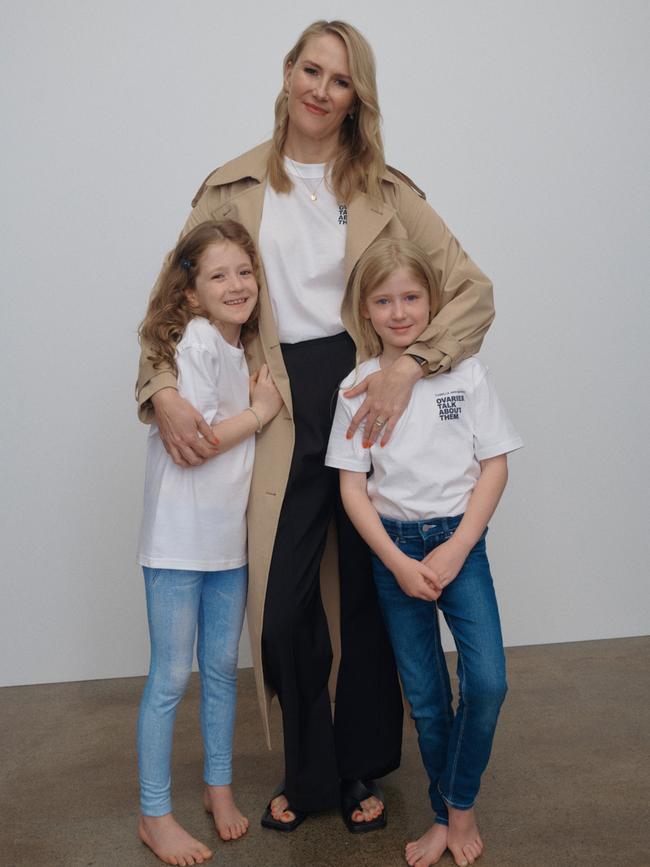
“When I was diagnosed I was horrified that ovarian cancer was known as the ‘silent killer’, with a significant lack of funding, awareness and discourse surrounding the disease. I made it my mission to make noise about this disease and raise awareness and funding for research.
“So this campaign aligns strongly with my mission — bringing ovaries out of the shadows into the spotlight, and making a tangible difference by directly funding research which will fund an early detection test, which we so desperately need.
“It’s not just good enough to talk about OC — although that is a good start. Ovarian cancer is the ... most underfunded women’s cancer. The survival rate for breast cancer only changed over the last 30 years through funding for research; this gives me hope, as we too can change the OC story if we fund life-saving research.
“We need to fund the big brains to find an early detection test as this disease is so hard to diagnose.
“I think for a long time, there’s been a lot of shame and secrecy around gynaecological cancers, in particular, ovarian cancer. I feel that women have felt ashamed to talk about their ovaries or where their cancer has come from ‘down there’.”
Saunders-Weinberg agrees: “It’s funny, men love talking about their balls, it’s time we got comfortable talking about our precious ‘balls’. Our balls are holy. Without our balls no one would exist. It’s time we break down the stigma. We have to get comfortable with being uncomfortable. The truth is there are more ovaries on the planet than humans. We should be proud of them, not shy. We live in a modern time where we all need to be open with our thoughts and feelings. Change is in the air all around us. We all need to head in that direction.
“Women have found their voices and our ovaries need to be part of that conversation. No matter who you are or where you come from, we all started from the same place – a tiny egg in an ovary.”
For more information or to buy a hoodie or T-shirt visit www.camillaandmarc.com/.
-
An ovarian cancer wake up call.
By Monica Saunders-Weinberg
During the past 3 weeks leading up to this campaign I have been unable to shake my feelings of shock and dismay at the understanding that an early detection test for ovarian cancer does not exist. Any one of us could be a ticking bomb.
Then, last Friday night, the wind was taken out of me when I got the news that one of my childhood best friends was advised by her doctor that she had a growth and, would be undergoing urgent surgery on Saturday morning.
Her symptoms had been innocuous. She had believed she had a UTI and was prescribed antibiotics for them. But while at her annual breast examination, the doctor testing her noticed her bloated stomach and recommended further investigation. She laughed and said “I know I look bloated or pregnant, I have a one-year-old daughter and we all look bloated sometimes”.
A couple of days later she had a pelvic ultrasound which showed a 20 x 20cm growth. That was last Tuesday. By Saturday she was on the operating table. The surgery lasted over six hours. There were three surgeons in the room and she woke to be told they had performed a hysterectomy, and that she has ovarian cancer. She now faces five months of chemotherapy.
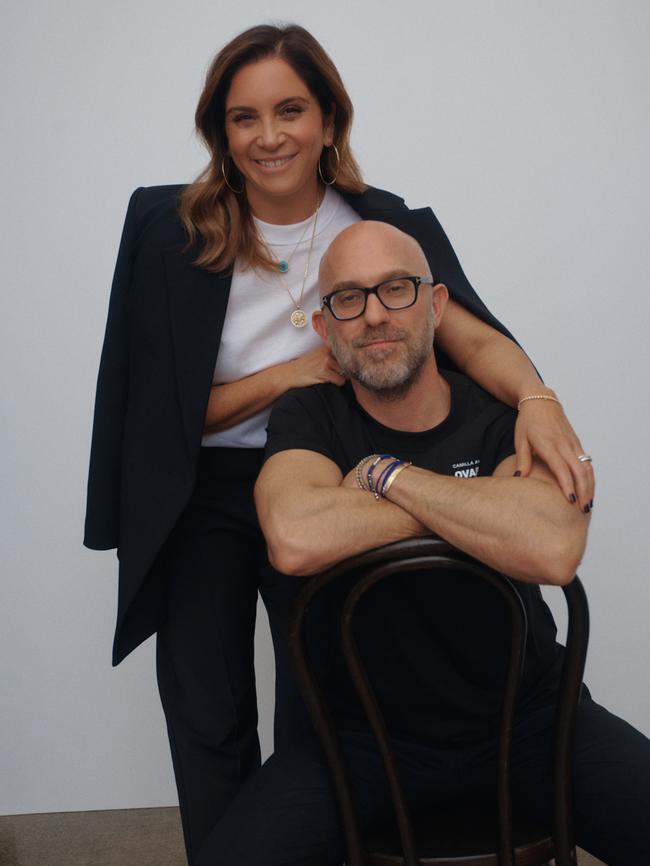
Those who know and love her are experiencing pain, disbelief and shock. The thought of her suffering and the road ahead is gut-wrenching. We keep asking the same question: “how could this not have been detected sooner? Why can’t we test for this?”
I still feel confused as I say it out loud. It doesn’t make any sense. And I have never felt more motivated to add my voice to this cause – to fund the research to find the test.
On the eve of the launch of this campaign, my friend is lying in a hospital bed with no female organs, staring into the eye of a storm of chemo, wondering how she will mother her one-year-old daughter whom she fought so hard to bring into this world.
As I write this I know that it doesn’t make any sense. No one deserves this. How is it that close to 30 years after Camilla and Marc’s mother died from this very disease are we still in the same place?
I am overwhelmed by this and I pray we see change by all coming together and shedding light on this disease.
Watching someone you love suffer is so painful. Knowing that a simple test would have changed this is driving me to play my part in this story.
This might be categorised as a ‘rare disease’ but to me, this is a scary, deadly disease that can affect any woman at any time without warning.
When we are told that it is a problem it’s often too late.
Who doesn’t get constipated and bloated with every cycle? We all do. Who would think that that was a signal for the C word? We need to come together now and find the answer.



To join the conversation, please log in. Don't have an account? Register
Join the conversation, you are commenting as Logout